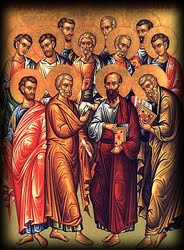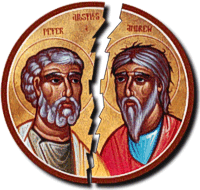Autocephalous or Independent Catholicism
Why Independent?

Many people might ask, "Why on earth would a church be independent, isn't that different to the historical church?"
Actually it is not so different. In the early Christian Church all local churches were independent and there was no chief governing head as you see it today. These church communities would be ministered to by, what we call today, Bishops and Deacons. The rank of priest came later, about the mid second century as the church expanded.
The Early Church:
Beginning in about the second century as the church moved from the cities and into the rural areas churches were led by priests. These groups of churches led by a number of priests in a given area were looked over or governed by a local Bishop. In this situation the Bishop would be the head of what is called a diocese. As the church grew and more dioceses were put into place they were looked over by a Metropolitan or Archbishop, usually located in the major cities. This form of church governance permitted better organization and supervision of orthodoxy. The Metropolitan and Archbishops did not rule but only supervised and every Bishop was to only worry about his own diocese unless orthodoxy was violated. Diocesan Bishops were to remain completely autonomous and were free to run their own jurisdictions as long as they stayed true to the faith.
Five Great Christian Sees:
As more churches developed throughout the known world, there was a need to be organized under the principal leadership of a Patriarch.
Patriarchs were heads of some of the largest and most important dioceses in the world in the first 1000 or so years of the church.
These Pentarchy were defined at the Council of Calcedon in Canon 28 as Jerusalem, Antioch, Alexandria, Rome and Constantinople.
Each served as a court of last appeal for internal church legislation and disciplinary matters.
Special honor was given to Rome and Constantinople because their sees were the seats of imperial Roman Government.
All these were equal in authority and had no power except in their own churches.
Today the Patriarch of Rome is known as the Patriarch of the West, or the Pope, and the Patriarch of Constantinople is the Ecumenical representative of the Eastern Orthodox Churches, but only in honor and not in authority.
A separation occurred on or about the year 1054 A.D. when the Patriarch of Rome asserted his power over the other Patriarchs claiming leadership rights and Papal authority over the whole Christian Church.
This is known as the Great Schism.
Patriarchalism:
Even though great honor was given to the five patriarchies, there is no Orthodox Canon or doctrine requiring that every canonical, local or world-wide jurisdiction must be in full communion with the Ecumenical Patriarch of Constantinople (Istanbul), Turkey, or any other Patriarch. Though the Patriarch in Constantinople of times long passed has the historic title of "first among equals" among all Orthodox Patriarchs, serving many times as its spokesman, but at no time exercising "temporal jurisdiction" over all Orthodox dioceses around the globe. Canonically, he is merely the 270th successor of the Apostle Andrew.
The Great Schism:
 As stated previously, a separation occurred on or about the year 1054 A.D. when the Patriarch of Rome asserted his power over the other Patriarchs claiming leadership rights and Papal authority over the whole Christian Church. This is known as the Great Schism. The end result of this schism was the beginning of the western Roman Catholic Church and the Eastern Orthodox Church.
Today if one looks to the east, better known as the Russian, Greek, Oriental and Coptic Orthodox churches, you will see how these independent juristictions are organized and maintained as in ancient times.
While in the west we see the Pope in Rome heading over the Roman Catholic Church as one supreme, infallible Papal leader.
We know this to be an incorrect way of leading our Lord's Church.
If we look to history we see that every time Papal supremacy has been exerted we have splits within the Church starting the major one in 1054 A.D.
Since then there have been many more smaller spilts and schisms specially in the west.
We have seen the errors which have led to the Reformation, we have seen the Anglican Split and also in the 1860's we see the beginning of Independent Catholicism with the emergence of the Old Catholic Church of Utrecht, Holland when once again during Vatican I, it was declared that the Pope was infallible.
It seems that every time the Pope makes an affirmation of his authority a split occurs in our Lord's Body. This authoritarian approach to Church governance is an error, we have seen it only lead to heartbreak and destruction of our Church.
Our Lord's prayer in Holy Gospel of St John was for Unity, not neccessarily conformity! Jesus wants us all to express our Love for Him however it may move a Tradition within Orthodoxy and the fullness of the Sacramental Faith.
As stated previously, a separation occurred on or about the year 1054 A.D. when the Patriarch of Rome asserted his power over the other Patriarchs claiming leadership rights and Papal authority over the whole Christian Church. This is known as the Great Schism. The end result of this schism was the beginning of the western Roman Catholic Church and the Eastern Orthodox Church.
Today if one looks to the east, better known as the Russian, Greek, Oriental and Coptic Orthodox churches, you will see how these independent juristictions are organized and maintained as in ancient times.
While in the west we see the Pope in Rome heading over the Roman Catholic Church as one supreme, infallible Papal leader.
We know this to be an incorrect way of leading our Lord's Church.
If we look to history we see that every time Papal supremacy has been exerted we have splits within the Church starting the major one in 1054 A.D.
Since then there have been many more smaller spilts and schisms specially in the west.
We have seen the errors which have led to the Reformation, we have seen the Anglican Split and also in the 1860's we see the beginning of Independent Catholicism with the emergence of the Old Catholic Church of Utrecht, Holland when once again during Vatican I, it was declared that the Pope was infallible.
It seems that every time the Pope makes an affirmation of his authority a split occurs in our Lord's Body. This authoritarian approach to Church governance is an error, we have seen it only lead to heartbreak and destruction of our Church.
Our Lord's prayer in Holy Gospel of St John was for Unity, not neccessarily conformity! Jesus wants us all to express our Love for Him however it may move a Tradition within Orthodoxy and the fullness of the Sacramental Faith.
Independent Catholicism:
Independent Catholics along with us the “Independent Catholic Orthodox Church” continues to follow the example of the early ancient church pioneers. Although Independent Catholicism has its roots in the Roman Catholic Church, it follows the faith held by those in the ancient Church as expressed in the creeds and the early ecumenical councils. Some Independent Catholic Churches, like us, also have apostolic succession through the Eastern Orthodox Church lines as well. This allows us to worship in both the western and eastern liturgical traditions handed down to us while keeping our faith orthodox. While there are divisions among us and although many on both sides of the fence are holding grudges, we realize that we are all human and have made mistakes. We continue to pray for unity among all Catholic and Orthodox brethren, as well as all Christians. We strive to develop relations with all jurisdictions who profess the true faith given to us by the Apostles. That is why we like to say we are Catholic Orthodox Christians.
If you have any questions about Independent Catholicism or wish to join us in worship of our Lord and God please contact us at xeniamission@gmail.com.
Imprimatur: +Frank S. Adams, M. Div., STM., DD
Bishop of the Diocese of Christ the King American Independent Catholic Church
|
 As stated previously, a separation occurred on or about the year 1054 A.D. when the Patriarch of Rome asserted his power over the other Patriarchs claiming leadership rights and Papal authority over the whole Christian Church. This is known as the Great Schism. The end result of this schism was the beginning of the western Roman Catholic Church and the Eastern Orthodox Church.
Today if one looks to the east, better known as the Russian, Greek, Oriental and Coptic Orthodox churches, you will see how these independent juristictions are organized and maintained as in ancient times.
While in the west we see the Pope in Rome heading over the Roman Catholic Church as one supreme, infallible Papal leader.
We know this to be an incorrect way of leading our Lord's Church.
If we look to history we see that every time Papal supremacy has been exerted we have splits within the Church starting the major one in 1054 A.D.
Since then there have been many more smaller spilts and schisms specially in the west.
We have seen the errors which have led to the Reformation, we have seen the Anglican Split and also in the 1860's we see the beginning of Independent Catholicism with the emergence of the Old Catholic Church of Utrecht, Holland when once again during Vatican I, it was declared that the Pope was infallible.
It seems that every time the Pope makes an affirmation of his authority a split occurs in our Lord's Body. This authoritarian approach to Church governance is an error, we have seen it only lead to heartbreak and destruction of our Church.
Our Lord's prayer in Holy Gospel of St John was for Unity, not neccessarily conformity! Jesus wants us all to express our Love for Him however it may move a Tradition within Orthodoxy and the fullness of the Sacramental Faith.
As stated previously, a separation occurred on or about the year 1054 A.D. when the Patriarch of Rome asserted his power over the other Patriarchs claiming leadership rights and Papal authority over the whole Christian Church. This is known as the Great Schism. The end result of this schism was the beginning of the western Roman Catholic Church and the Eastern Orthodox Church.
Today if one looks to the east, better known as the Russian, Greek, Oriental and Coptic Orthodox churches, you will see how these independent juristictions are organized and maintained as in ancient times.
While in the west we see the Pope in Rome heading over the Roman Catholic Church as one supreme, infallible Papal leader.
We know this to be an incorrect way of leading our Lord's Church.
If we look to history we see that every time Papal supremacy has been exerted we have splits within the Church starting the major one in 1054 A.D.
Since then there have been many more smaller spilts and schisms specially in the west.
We have seen the errors which have led to the Reformation, we have seen the Anglican Split and also in the 1860's we see the beginning of Independent Catholicism with the emergence of the Old Catholic Church of Utrecht, Holland when once again during Vatican I, it was declared that the Pope was infallible.
It seems that every time the Pope makes an affirmation of his authority a split occurs in our Lord's Body. This authoritarian approach to Church governance is an error, we have seen it only lead to heartbreak and destruction of our Church.
Our Lord's prayer in Holy Gospel of St John was for Unity, not neccessarily conformity! Jesus wants us all to express our Love for Him however it may move a Tradition within Orthodoxy and the fullness of the Sacramental Faith.
